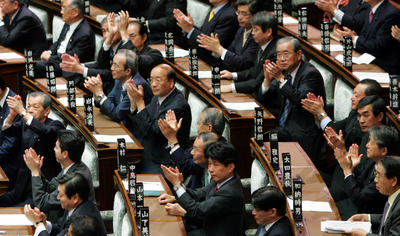In Japan, the concurrence of this nationalist surge with shifts in the political arena and the pending election cycle could determine the shape of the next government, and facilitate a revision of Japan’s pacifist constitution.
Japan’s political spectrum is in the throes of disintegration and realignment. The Democratic Party of Japan (DPJ) has been torn by Ichiro Ozawa’s decision in July to defect and form a rival party, and by discontent with Noda’s push for consumption-tax reform. At the same time, the advent of several regional political groupings — including the high-profile Osaka Ishin no Kai under Toru Hashimoto, and alternative policy forums such as the Minkan Kenpo Rincho — promises to provide a new political home for disaffected members of existing mainstream parties.
Those who favour some kind of revision of Article 9, the pacifist clause of Japan’s constitution, are spread between mainstream parties and new groupings. During the recent skirmishes between China and Japan over rightist landings on the Senkaku/Diaoyu Islands, the DPJ’s Seiji Maehara and the Liberal Democratic Party (LDP)’s Shinzo Abe acknowledged the Japanese hotheads, painting them as patriots responding to provocation. Both are hawkish when it comes to security policy and constitutional revision. For his part, Hashimoto is on the record as aspiring to hold a referendum to revise the pacifist clause and enhance Japan’s individual defence capability. In April the LDP released another draft document containing proposed revisions to the constitution that would acknowledge Japan’s right to collective self-defence.
Seasoned political destroyer Ozawa is well known for his trenchant opposition to the practice of relying on the Cabinet Legislation Bureau to determine whether or not Japan can exercise its right to exclusive self-defence. Ozawa’s idea of constitutional revision is to eradicate the glaring contradiction between Japan’s absolute pacifist norm as presented in Article 9, and the existence of what he regards as a legitimate military force for the purposes of self-defence. Ozawa also favours acknowledging Japan’s right to collective self-defence, provided it falls under the auspices of the UN. While Ozawa’s People’s Lives First Party has not yet secured significant alliances with other groups, his consummate opportunism may place him at the centre of the action again. While many of his policy positions alienate other groups, on constitutional revision Ozawa is on trend.
As for Prime Minister Noda, even before the rightist confrontations over the Senkaku/Diaoyu in August he had openly stated that he shared the aspiration of enabling Japan to engage in collective self-defence. In the aftermath of the Senkaku/Diayoyu clash, Noda has rapidly positioned himself as the national champion of ‘buying back’ four of the five islands from their Japanese private-sector owners, outmaneuvering the right-wing Tokyo mayor, Shintaro Ishihara, in the process.
The spike in territorial disputes could become a centripetal force for the formation of new coalitions of security-policy cohorts from across the political spectrum in Japan. It is possible that defence, and by implication constitutional revision, could become the issue that not only channels political opportunism, but enables individuals such as Noda to seize the political initiative. Instead of resisting realignment, he would seek to lead it, using defence as a strategic lever. Alternatively, depending on how the chips fall in the pending lower-house election (which might be held later this year) and the half upper-house election (due in mid-2013), the hub of ‘new’ political groups, in the form of opportunistic coalitions, could morph into kingmakers that determine the next administration and its core policy platform.
In the context of political realignment and the foreign/defence policy crisis, nationalist voices from outside the formal political sphere are making themselves heard. And all of this is happening at a time when power transitions are about to take place in China and South Korea as well as Japan. Having recently seen the ROK step back from two bilateral agreements, the General Security of Military Information Agreement and the Acquisition and Cross-Servicing Agreement, it should be clear to Japanese policy makers that appeasing nationalists at home comes at a price. Failure to lock in sound bilateral defence cooperation will hamper any future multilateral action that may be required to deal with the DPRK.
For Japan, the nexus of political change and territorial disputes could facilitate the elimination of tension in the constitution between passive pacifism and the maintenance of defence forces. It could also extend to Japan embracing the right to collective self-defence, with or without the sanction of a UN-sponsored action. If devised and delivered in a climate of threat and jousting nationalists throughout the Northeast Asian region, these revisions could contribute to even greater insecurity in a region already replete with security challenges.
Rikki Kersten is Professor at the Department of Political & Social Change, School of International, Political & Strategic Studies, Australian National University.

